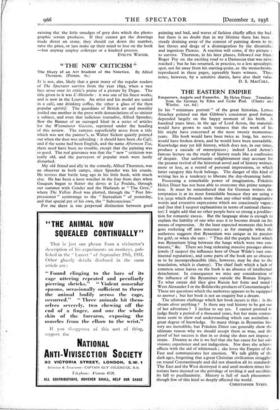THE EASTERN EMPIRE
Emperors, Angels and Eunuchs. By Helen Diner. Translated from the German by Eden and Cedar Paul. (Chatto and Windus. 12s. 6d.) - IN his " miniature portrait " of the great historian, Lytton Strachey pointed out that Gibbon's consistent good fortune depended largely on the happy moment of his birth. A hundred years later, in the age of Lord Acton, the materials would have grown to such vastness that the work of his life might have concerned at the most twenty momentous years. His book would have been twice as long, his nerves would have broken down, and he would have been unreadable. Knowledge may yet kill history, which does not, in our times, produce a cascade of masterpieces ; indeed Lord Acton's famous lecture on the study of history reads like a confession of despair. Our unfortunate enlightenment may account for the present revival of the historical novel and of history written, more or less, as a record of personal impressions, to which latter category this book belongs. The danger of this kind of writing lies in a tendency to liberate the day-dreaming habit.
Possessing a remarkable power of imagination, Fraulein Helen Diner has not been able to overcome this prime tempta- tion. It must be remembered that for German writers the temptation is at its most formidable because they are using a km:,uage which abounds more than any other with imaginative words and evocative expressions which are consciously vague ; and (but that I suspect explanations in terms of national charac- ter) I might add that no other people have so strong a predilec- tion for romantic excess. But the language alone is enough to explain the liability of one who uses it to become drunk on his means of expression. 'At the least expected moments this book goes rocketing off into nonsense ; as for example when the authoress suggests that Byzantium was unique in its passion for gold, or when she says : " Thus did the purple heart which was Byzantium' lying between the lungs which were two con- tinents," &c: There are long sickening massive passages about jewels (I suspect the influence here of Oscar Wilde's vast con- tinental reputation), and some parts of the book are so obscure as to be incomprehensible (this, however, may be due to the translation, which is clumsy). The chief fault which a lack of common sense leaves on the book is an absence of intellectual detachment. In consequence we miss any consideration of the influence of the Byzantines outside the Roman Empire. To what extent did they give Ruisia her form and mind ? Were Alexander I or the Bolsheviks products of Constantinople ? These are questions which the authoress appears to be equipped to answer ; but her book is not an enquiry but a dream.
The ultimate challenge which her book incurs is this : is the
dream about anything ? Is there any real history to be got out of her adventure ? I incline to say yes. I cannot pretend to
judge finely a period of a thousand years, but her main conten-
tions seem to show real understanding which can assimilate a great degree of knowledge. So many things in Byzantine his-
tory are incredible, but Fraulein Diner can generally show the
ultimate reason why we should accept them as true, and the proof of her success is that in so doing she does not impose a
strain. Dreamy as she is we feel that she has cause for her odd visions; experience and not indigestion. Nor does she achieve effects with the aid of whitewash ; she loves the Empire of the East and communicates her emotion. We talk glibly of the dark ages, forgetting that a great Christian civilisation struggled on round Constantinople and did not abandon all its standards.
The East and the West destroyed it and until modern times his- torians have insisted on the privilege of reviling it and ascribing its fall to pusillanimity. History is full- of such phenomem, though-few of this kind so deeply affected the world.
CHRISTOPHER SYICES.


























































 Previous page
Previous page